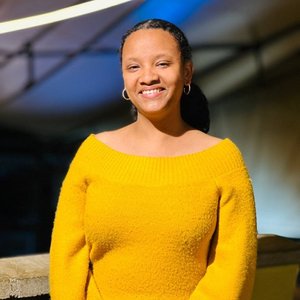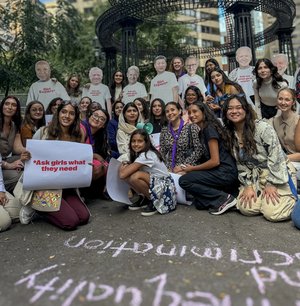Breaking chains and building dreams: Nicol Duran-Peña’s journey through exalt
(Photo courtesy of Nicol Duran-Peña)
15-year-old Nicol Duran-Peña shares her experience with exalt, a youth programme aimed at helping those in the criminal justice system build life skills and connecting them with mentors.
Since graduating from college, I have been working with young people at exalt, a dynamic internship programme dedicated to empowering court-involved youth. exalt equips 15-19-year-olds across New York City with the essential skills needed to achieve their personal and professional goals and avoid further criminal justice involvement.
At exalt, I had the pleasure of meeting Nicol Duran-Peña, a brilliant 15-year-old student enrolled in one of our cohorts, or cycles, as we fondly call them at exalt. Nicol and I have grown very close and I continued mentoring her after she graduated from the programme.
I sat down with Nicol to ask her some questions about her experience in the programme.
TS: What was it like growing up as a girl in New York City?
NDP: I was born in the Dominican Republic and I moved to East New York when I was 5. Since moving to the United States, I’ve lived in Brooklyn, Queens, Manhattan, and the Bronx, and I have attended five different schools. I experienced a lot of violence growing up, even when I was in school.
Nearly every year since the second grade, I have had very traumatizing experiences. I have had to interact with the police, the NYC Administration for Children Services (ACS), and other agencies. Some of these interactions happened in school. One time, I came to school with a black eye because my little brother and I were fighting at home, and I accidentally hit my face on a table. A staff member at school tried to pressure me into saying my mom gave me the black eye. I was only 8 years old. I felt very scared. They called my mom and told her she needed to come to school. When she arrived, cops handcuffed and arrested her. While she was at the precinct, I had to stay with my aunt.
Even though I’ve had many similar traumatic experiences, I also have good memories of growing up in New York City.
"I was born in the Dominican Republic and I moved to East New York when I was 5. Since moving to the United States, I’ve lived in Brooklyn, Queens, Manhattan, and the Bronx, and I have attended five different schools." (Photo courtesy of Nicol Duran-Peña)
TS: What led you to the exalt programme?
NDP: My probation officer referred me to exalt so that I could work on my personal goals and growth. She told me the programme would help me develop important life skills and I would be paid for participating. I never really had a job before so that made me interested. Several factors led me to the criminal justice system. The people I used to hang around were a bad influence. We would get into fights and I often felt peer pressured to do illegal things. I didn't know what I wanted to do with my life or where it was headed. I did not have any direction. exalt encouraged me to start caring about my future and helped me imagine better possibilities for myself as a low-income, Afro-Latina girl. For example, I want to finish high school and go to college to study forensic science. I also want to own my own cosmetology business.
“Schools should let kids be more creative and put less pressure on them. Schools should also make kids feel welcome.”
TS: You have expressed that exalt was a better version of school, can you please explain how?
NDP: At exalt, I was challenged to become a better person, not just a better student. I learned more in exalt in the two hours I was here every day than I learned in school during eight hours. exalt allowed me to be creative by giving me the space to mess up. At school, I feel like there is only one right answer.
I also feel safer at exalt than I do at school. At school, I don’t always feel heard and I don’t always have the space to fully express my anger and frustration. You and Ms.Shalisia-Earth are so much more patient with me than my teachers. You both give me the benefit of the doubt instead of assuming that I am just a bad kid. I don’t really feel like that at school.
exalt is also a better version of school because the office is so much cleaner and nicer than most of the schools I have been in. For example, there are a lot of windows and the office is really bright and sunny most of the time. There are also lots of plants around the office so it feels easier to breathe. You can see the Statue of Liberty, Staten Island, and Battery Park from the classrooms. Learning in a nice place makes me actually want to stay instead of leaving.
TS: In a perfect world, how could schools improve to better accommodate students whose experiences are more like yours? Are there subjects you think should be covered more in classrooms?
NDP: Schools should let kids be more creative and put less pressure on them. Schools should also make kids feel welcome. I have to go through a metal detector every day at school. Even though I never bring anything bad, it still makes me feel uncomfortable because it feels like they don’t trust me.
“I learned that in the United States, kids who do not finish high school are more likely to be incarcerated than kids who do finish high school. This made me realize there was a connection between education and freedom.”
TS: What were your hobbies outside of the exalt programme?
NDP: One of my hobbies outside of exalt is doing hair. I can do a lot of hairstyles such as ponytails and box braids. I taught myself by watching YouTube videos and watching others do hair. Right now, I’m working on starting my own business, where I will offer hair, nail, and lash extension services. I’ve already made an Instagram page for my business and I am now working on making business cards with your help. I have already started advertising to other girls in the exalt programme. I hope to get customers that way.
I also really enjoy cooking. I like making pasta, pancakes, seafood, steak, and more. My favorite thing to cook is Dominican-style pasta. My grandmother taught me how to make it when I was 12 years old.
"I do not always like school but I now see how important it is to graduate because many jobs require you to have a high school diploma." (Photo courtesy of Nicol Duran-Peña)
TS: What was the most important lesson you learned in the exalt programme?
NDP: One of the most important lessons I learned during exalt is to focus on school. During the lesson on the school-to-prison pipeline, I learned that in the United States, kids who do not finish high school are more likely to be incarcerated than kids who do finish high school. This made me realize there was a connection between education and freedom. I do not always like school but I now see how important it is to graduate because many jobs require you to have a high school diploma. Having a job is important because it can keep you busy and out of the streets. Being in the exalt programme has kept me busy and away from trouble. When I did not have anything productive to do, I would do bad things like go outside and fight people who made me mad. But now that I have positive things to do, it is easier to just focus on my work.
I also learned to surround myself with positive influences like my classmates at exalt who were also working on their goals. Now I think about the kinds of friends I want to make. I want friends who are positive and do not like drama.
In the programme, I also learned how to budget using the stipend I got. Again, I never had a job before this, and my family is poor, so I never practiced saving money.
“In 5 years, I see myself in college with a successful business. Having goals for myself makes me excited for the future.”
TS: What would you want teachers to better understand about students dealing with ACS or other types of challenges at home? Is there an approach or training that would be more helpful?
NDP: Teachers should not just call ACS without speaking to students to see what is really going on. They should first try to have a talk with parents and their kids and a therapist so that they can fully understand the situation. Calling ACS without understanding the whole situation can make kids end up in even worse places than their homes. I know kids in the foster care system who have been through a lot. Sometimes they are abused and do not have enough food to eat.
TS: How has the programme helped you envision a better future for yourself?
NDP: exalt has helped me envision a better future for myself by giving me the tools to succeed. exalt is like a step-by-step book on how kids like me can improve their lives. I now know how to manage my time, work towards my goals, and manage my money. These are not skills I was taught at school or anywhere else. Having these skills makes me feel like I am in control of my life and future and that I know where I am headed.
In 5 years, I see myself in college with a successful business. Having goals for myself makes me excited for the future.
TS: How has having women mentors in the programme shaped who you are today?
NDP: Having women mentors like you and Ms.Shalisia-Earth helped me see how powerful and smart women can be. At first, I was nervous because my class was mostly boys, but you guys made me feel more comfortable.
As Black women, you guys also understand what it’s like being a young Black girl so I felt like we can relate to each other. This made it easier for me to open up to you both.
I see that you are both successful despite growing up low-income and Black, which makes me optimistic about my future. If you guys can do it, so can I.
This interview was condensed and edited for clarity.
 Read more
Read more













